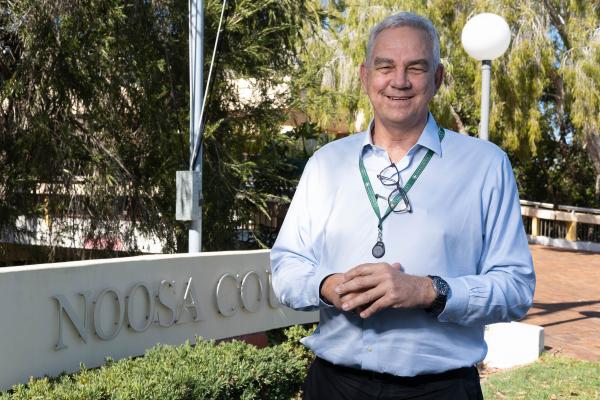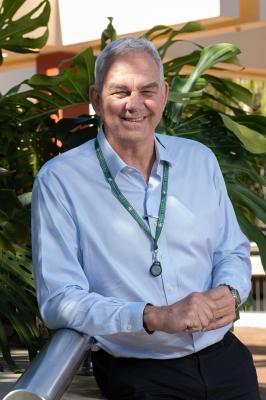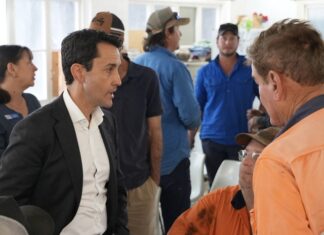Larry Sengstock, Noosa Council’s new Director for Infrastructure Services, has returned to the Noosa of his youth after a distinguished and storied career as a pro basketballer, Olympian, educator, sports administrator and marketer, and wizard of big ticket infrastructure. It’s an impressive CV and a big story about sport and life skills. In this, the first of a two-part Hotseat interview, PHIL JARRATT sat down with the former Brisbane Bullet and Boomers captain as the Tokyo Olympics got underway to discuss how sport can mould your life.
So this giant kid emerges in Maryborough in the late ‘60s and he’s good at swimming, surfing and basketball?
Well, I was never a great surfer, and now I can’t do it much because of my banged-up shoulders and hips, but it’s something I really want to get back into. I was a swimmer firstly, and then basketball took over, but I’ve always had a love of the water. I was a good swimmer and every holidays I’d go down to Brisbane to train with [legendary swim coach] Harry Gallagher. Then when I started in basketball, I’d go to Melbourne to train with the squads down there. When I came through as a kid, it was right after the 1976 Montreal Olympics where Australia did nothing, and the edict went out in all sports to look for new talent. I was this six-foot, six-inch newcomer, a 16-year-old from Maryborough already playing in the national championships, so I was asked to try out for the Australian squad and became the youngest ever to play for the Boomers at 17.
What do you put that rapid ascent down to?
Right time, right place, and a great mentor in Ray Alloway, who was my teacher at primary school, a basketball nut way ahead of his time in terms of the fundamentals. He nurtured a group of us and we won the under 16s national championship for Queensland. You often find that’s the way it works in sport – one person will take charge and bring you along the way to success. Ray was that person for me.
I vaguely remember hearing Maryborough mentioned as one of a very small number of towns that seem to breed champions.
Yes, and what you’re thinking of is that at the time of the Sydney Olympics they established Walk of Fame parks in different towns. In Maryborough, David Tyler was a swimming hero and we all swam in the David Tyler Pool, but when I was captain of the Boomers, Maryborough could also claim the captain of the women’s hockey and the men’s hockey teams. Not bad for a town of 20,000.
Do you still have family connections in Maryborough?
Not really. My parents moved to Noosa 40 years ago, and they’re still here in their 90s.
I started surfing at Main Beach in 1970 when I was 10 when we used to holiday here, before Mum and Dad sold their business and moved here for good.
Your first Olympics was Moscow 1980, which seems to me to have some parallels with Tokyo 2020, in that there has been a tremendous amount of pressure on athletes to make personal decisions about whether to go. It was the Soviet invasion of Afghanistan back then, it’s Covid now, but the pressure is much the same. Do you agree?
Yes, I do. In 1980 the government of the day was putting pressure on athletes not to go, and the Tracey Wickhams of the world unfortunately decided not to go. But I think there was more pressure on the individual sports than there was on the teams. When we got to Moscow I remember coach Lindsay Gaze saying to the team, “This is the Olympic Games, of course we’re marching!” I was just an innocent young kid. (Laughs)
Did the political pressure die away once the Games had begun?
Absolutely. The US wasn’t there, of course, but there were plenty of good teams and we just wanted to do well, and we did. We were in the mix.
Was it the next Games, LA, when the Boomers almost medalled?
That was Seoul in ’88. We made the final four but then America lost to Russia and had to play off for bronze with us, and they got it. That was as close as I got to an Olympic medal.
Going back to the pressure on athletes, we’ve seen two leading Australian players, Liz Cambage and Ben Simmons, bow out of the Olympics in the past few weeks, citing personal pressures. Is it harder on them than it was in your day?
It’s a different kind of pressure. We were more contained in our own world, with no pressure from social media. We could get into our own space. Yes, there were pressures on us but nobody talked about it. Now people are always asking athletes if they’re feeling the pressure and it becomes self-fulfilling.
If you had still been running Basketball Australia, what would you have told Liz and Ben?
I think they both had to make their own decisions. I know Lizzie and she’s a lovely person but she does get caught up in this stuff and influenced by it. Ben’s situation is more like that of [former NBA player] Andrew Bogut where tremendous amounts of money are involved and they have to look after their careers. I would have loved to see Ben go to the Games. It would have been good for him to loosen up a bit and hang out with Australian team-mates, which is quite different to the NBA.
Is that the reason you didn’t play in the NBA?
No, it was because I wasn’t good enough. (Laughs)
The history tells me otherwise.
Yeah, in those days it just wasn’t the done thing. Foreign players were rare on the NBA and you had to be exceptional to crack it. It wasn’t on my radar, although I had offers to go to college in the US.
You had an illustrious playing career by anyone’s standards – four Olympics, five world championships, five NBL championships and much more. What stands out as the highlight?
In my international career it was finally cracking it to top four at the Seoul Olympics. In Australia all five club championships were wonderful. It was at the time that basketball had just taken off, and we rode that wave, going from paying to train to getting paid to play in front of huge crowds. They were special times.
You played for the Brisbane Bullets for several seasons but you probably spent more of your career in Victoria. Do you still consider yourself a Queenslander?
That’s one of the reasons I’ve come back! I’d spent more than half my life in Victoria, but I’ve always been a Queenslander.











